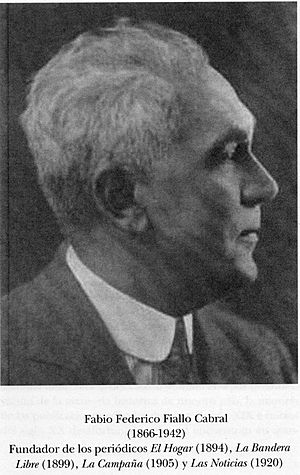Fabio Fiallo facts for kids
Quick facts for kids
Fabio Fiallo
|
|
|---|---|
 |
|
| Born |
Fabio Federico Fiallo Cabral
3 February 1866 |
| Died | 29 August 1942 |
| Occupation | Writer, poet, politician, diplomat |
| Spouse(s) |
Prudencia Lluberes Contreras
(m. 1892; died 1897)María Luisa Bonetti Ernest
(m. 1905) |
| Relatives |
|
Fabio Fiallo (born Fabio Federico Fiallo Cabral on February 3, 1866 – died August 29, 1942) was an important writer, poet, politician, and diplomat from the Dominican Republic. He is best known for his short stories and poems written in a "modernist" style, which was new and exciting for its time. He was also a strong voice against the American occupation of his country from 1916 to 1924.
Fabio Fiallo was very patriotic. He was one of the main leaders who spoke out against the occupation. Because of his political writings, he was sent to jail in 1920. Besides his patriotic works, Fiallo also wrote romantic poems about love and strong feelings. His most famous prose works are his two books of short stories: Cuentos Frágiles (Fragile Stories) and Las Manzanas de Mefisto (The Apples of Mephisto). Cuentos Frágiles was first published in New York in 1908. It became popular around the world and was translated into German, French, Italian, and Portuguese. He passed away in 1942 in Cuba, where he was living away from his home country.
Contents
Fabio Fiallo's Early Life
Fabio Fiallo was born on February 3, 1866, in Santo Domingo, Dominican Republic. His family had a strong history in politics. His father, Juan Ramón Fiallo Rodríguez, was a politician and a member of Congress. His mother, Ana María Cabral y Figueredo, was the niece of a president, General José María Cabral.
Fabio started writing poetry when he was just twelve years old, after he fell in love. His father also guided him in politics from a young age. His father even helped negotiate a peace treaty between Haiti and the Dominican Republic. Fabio began studying law at the Instituto Profesional de Santo Domingo. However, he soon left his studies to focus on his passion for politics and poetry.
Fabio Fiallo was also the uncle of the famous fashion designer Oscar de la Renta. Another nephew, Viriato Fiallo, was also his son-in-law. This happened because Viriato married Fabio's daughter, Prudencia Fiallo.
Fabio Fiallo's Career and Activism
Fabio Fiallo's strong political beliefs often affected his writing career. He was put in prison for defending the Dominican Republic's independence. This happened during the American occupation of the Dominican Republic (1916–24).
He started several newspapers, including El Hogar (in 1894), La Bandera Libre (in 1899), La Campaña (in 1905), and Las Noticias (in 1920). He also wrote for other newspapers like the Listín Diario and El Lápiz. In 1900, he was arrested along with Arturo Pellerano Alfau, the director of Listín Diario. This happened during a time when the government was trying to control the press.
In 1916, Fabio Fiallo became a member of the National Press Association. This group included other important writers and thinkers like Américo Lugo. Through this group, they sent the first complaints to other countries about the U.S. occupation of the Dominican Republic.
Later in 1916, Fiallo was arrested again. He was accused of being part of a revolutionary movement. He was sent to prison and ordered to pay a large fine. His "crime" was publishing an article in the Listín Diario before it was approved by the censorship committee. But being jailed did not stop Fiallo. Instead, it made him even more determined to fight for his country.
Fabio Fiallo passed away in Havana, Cuba, on August 29, 1942. In 1977, his remains were brought back to the Dominican Republic. They now rest in the National Pantheon of the Dominican Republic in Santo Domingo.
Fabio Fiallo's Poetry and Stories
Even though he is not as widely known today, Fabio Fiallo was a close friend of Nicaraguan poet Rubén Darío. Darío was a leader of the modernist writing movement and greatly admired Fiallo. Darío once said, "Few times have I written about a poet with so much pleasure as now about Fabio Fiallo. I love the souls of pearl and the manners of silk."
Fabio Fiallo loved beautiful things, luxury, and exotic places. Some critics have said his poems were similar to those of Becquer, Heine, and de Musset. However, Fiallo himself said he was not influenced by Heine or Becquer. He felt he was not as bitter as Heine or as sad as Becquer.
The poet Juana de Ibarbourou called him the "Alfredo de Musset of America." She admired his elegant and rich verses. She noted that his poems did not talk about hard work or modern, noisy things. She said he was "backward" in a good way, like a king in a time of revolution, just like Darío, Heine, and Becquer. Fiallo also mentioned that the writers who influenced his short stories the most were Guy de Maupassant, Catulle Mendès, and Edgar Allan Poe.
Fabio Fiallo's Main Works
- Primavera sentimental (Sentimental Spring) (1902)
- Cuentos frágiles (Fragile Stories) (1908)
- Cantaba el ruiseñor (The Nightingale Sang) (1910)
- Canciones de la tarde (Evening Songs) (1920)
- Plan de acción y liberación del pueblo dominicano (Action Plan for the Liberation of the Dominican People) (1922)
- Jurb (1922)
- La cita (The Date) (1924)
- Canto a la bandera (Song to the Flag) (1925)
- La canción de una vida (The Song of a Life) (1926)
- Las manzanas de Mefisto (The Apples of Mephisto) (1934)
- El balcón de Psiquis (Psyche's Balcony) (1935)
- Poemas de la niña que está en el cielo (Poems of the Girl in Heaven) (1935)
- Sus mejores versos (His Best Verses) (1938)
Images for kids
See also
 In Spanish: Fabio Fiallo para niños
In Spanish: Fabio Fiallo para niños
 | Frances Mary Albrier |
 | Whitney Young |
 | Muhammad Ali |


